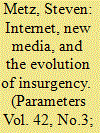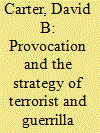| Srl | Item |
| 1 |
ID:
122398


|
|
|
|
|
| Publication |
2012.
|
| Summary/Abstract |
I
nsurgency, like war, has an enduring nature and a changing character. It
remains a strategy entailing violence used by the weak and desperate against
a power system.1
Often (but not always), this pits a nonstate or proto-state organization against a state. Out of weakness, the organization using a strategy of
insurgency attempts to shift the focus of conflict away from domains where the
state or other power structure is particularly strong, particularly the conventional military. Insurgents seek to make domains decisive where morale and
other psychological characteristics matter more than tangible power, recognizing these characteristics even the odds to a certain extent. The enduring nature
of insurgency includes three core functions: an insurgency must survive, it must
strengthen itself, and it must weaken the power structure or state.
|
|
|
|
|
|
|
|
|
|
|
|
|
|
|
|
| 2 |
ID:
145012


|
|
|
|
|
| Summary/Abstract |
Violent nonstate groups are usually weaker than the states they target. Theory suggests that groups carefully condition their choice of tactics on anticipated state response. Yet scholars know very little about whether and how groups strategically plan attacks in anticipation of state response. Scholars do not know if and under what conditions groups employ violent tactics to provoke or avoid a forceful state response, although extant theory is consistent with both possibilities. Relatedly, there is little systematic evidence about why groups choose terrorist or guerrilla tactics and how this choice relates to anticipated state response. I develop a theoretical and empirical model of the interaction between groups and states that generates unique evidence on all three fronts. Using data on attacks in Western Europe from 1950 to 2004, I show that guerrilla attacks are sometimes associated with provoking forceful state response, whereas terrorist attacks are generally associated with avoiding forceful response. Groups effectively choose their tactics to avoid forceful state responses that are too damaging for themselves but provoke forceful responses that disproportionately harm civilians. These findings survive several robustness and model specification tests.
|
|
|
|
|
|
|
|
|
|
|
|
|
|
|
|